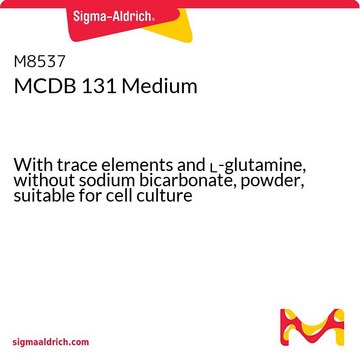M6770
MCDB 201 Medium
With trace elements, L-glutamine and 30 mM HEPES, powder, suitable for cell culture
Sinónimos:
MCDB medium
Iniciar sesiónpara Ver la Fijación de precios por contrato y de la organización
About This Item
UNSPSC Code:
41161501
NACRES:
NA.75
Productos recomendados
Quality Level
form
powder
technique(s)
cell culture | mammalian: suitable
components
HEPES: 7.149 g/L (30mM)
glucose: 1.441 g/L (Dextro)
phenol red: 0.001242 g/L
sodium pyruvate: 0.055 g/L
L-glutamine: 0.14615 g/L
shipped in
ambient
storage temp.
2-8°C
General description
MCDB 201 medium is a modified Ham′s nutrient mixture F-12 that is synthesized for the clonal growth of chicken embryo fibroblasts.
Application
MCDB 201 Medium has been used as a component of:
- the hepatic differentiation medium to culture pluripotent stem cells,
- epididymal growth medium for culturing of preadipocytes,
- Dulbecco′s Modified Eagle Medium (DMEM)/F12 for culturing of human umbilical cord mesenchymal stem cells
Quantity
Formulated to contain 17.7 grams of powder per liter of medium.
supplement
Referencia del producto
Descripción
Precios
Storage Class
11 - Combustible Solids
wgk_germany
WGK 1
flash_point_f
Not applicable
flash_point_c
Not applicable
Certificados de análisis (COA)
Busque Certificados de análisis (COA) introduciendo el número de lote del producto. Los números de lote se encuentran en la etiqueta del producto después de las palabras «Lot» o «Batch»
¿Ya tiene este producto?
Encuentre la documentación para los productos que ha comprado recientemente en la Biblioteca de documentos.
Los clientes también vieron
Jeff Ishibashi et al.
Molecular and cellular biology, 32(12), 2289-2299 (2012-04-05)
Fibroblastic preadipocyte cells are recruited to differentiate into new adipocytes during the formation and hyperplastic growth of white adipose tissue. Peroxisome proliferator-activated receptor γ (PPARγ), the master regulator of adipogenesis, is expressed at low levels in preadipocytes, and its levels
Baris Ulum et al.
Journal of cellular physiology, 233(11), 8429-8436 (2018-05-26)
Bone marrow mesenchymal stem cells (BM-MSCs) are promising candidates for regenerative medicine purposes. The effect of obesity on the function of BM-MSCs is currently unknown. Here, we assessed how obesity affects the function of BM-MSCs and the role of endoplasmic
Philip Roelandt et al.
Methods in molecular biology (Clifton, N.J.), 997, 141-147 (2013-04-03)
Differentiation of human stem cells to hepatocytes is crucial for industrial applications as well as to develop new therapeutic strategies for liver disease. The protocol described here, using sequentially growth factors known to play a role in liver embryonic development
Philip Roelandt et al.
PloS one, 5(8), e12101-e12101 (2010-08-17)
Stem cell-derived hepatocytes may be an alternative cell source to treat liver diseases or to be used for pharmacological purposes. We developed a protocol that mimics mammalian liver development, to differentiate cells with pluripotent characteristics to hepatocyte-like cells. The protocol
C-S Bao et al.
European review for medical and pharmacological sciences, 22(19), 6436-6447 (2018-10-20)
This research aimed to investigate the therapeutic effects of transplanted human umbilical cord mesenchymal stem cells (hUCMSCs) on spinal cord injury in mice and to explore its molecular mechanism. Spinal cord injury model in C57BL/6J mice was established. On the
Nuestro equipo de científicos tiene experiencia en todas las áreas de investigación: Ciencias de la vida, Ciencia de los materiales, Síntesis química, Cromatografía, Analítica y muchas otras.
Póngase en contacto con el Servicio técnico









